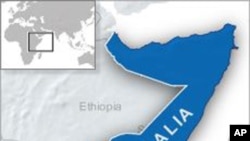A pro-Somali government force has captured a strategic town in the Gedo region near the Kenyan border, launching a long-awaited offensive to flush out al-Shabab militants from their strongholds in the south of the country. The offensive has also raised concern among some clans in the area.
Somalia's U.N.-backed Transitional Federal Government says its forces attacked and seized the town of Bulo Hawo from al-Shabab militants on Sunday. The government says 11 militants were killed and scores wounded during several hours of heavy fighting.
Calling the capture of Bulo Hawo a "major victory" against the al-Qaida-linked group, government Information Minister Abdirahman Omar Osman said the offensive was part of a strategy to liberate al-Shabab-controlled towns in Gedo, Bakool, and Hiran regions. He said government forces are moving towards the Islamist stronghold of Luq, located about 60 kilometers east of Bulo Hawo.
The government's military strategy, drawn up in late July in Addis Ababa, Ethiopia at a meeting sponsored by the East African Intergovernmental Authority on Development, aims to capture ground from al-Shabab and expand control beyond the several districts the government holds in the Somali capital Mogadishu.
In Gedo, the push is being led by Somali parliament member and factional leader Barre Hirale, who once controlled the key southern port city of Kismayo before he and his clan-based militia were chased out by Islamist forces in 2006 and again in 2008.
Residents in Bulo Hawo say they are relieved to see the town free of al-Shabab militants, who took control of the area about a year ago and imposed a strict form of Islamic law that included amputations of limbs and beheadings. But Hirale's prominent role in the offensive is also raising concerns that clan fighting could re-ignite in the Jubaland region of southern Somalia.
Hirale is a member of the Marehan, a sub-clan of the larger Darod tribe. The Marehan is one of several clans, including another Darod sub-clan called the Ogaden, who have historical claims to Jubaland. Territorial disputes and struggles for control of resources have sparked numerous clan conflicts in the past.
Ogaden clan elders tell VOA there is fear that Hirale, under the guise of flushing out al-Shabab, will try to re-take Kismayo and put the city and its surrounding regions under Marehan control once again. The elders say that the Ogadenis would oppose that move, warning that some Ogadeni fighters may even join al-Shabab in order to defeat Hirale's forces.
Meanwhile, there are conflicting reports about who is in control of Dhusamareb, a strategic town in the Galgadud region. Clashes there between al-Shabab and Ahlu-Sunna Wal-Jama'a forces Friday reportedly killed as many as 20 people and wounded 30 others.
Al-Shabab spokesman Ali Mohamud Rage told reporters in Mogadishu that militants captured the town after they killed several Ahlu-Sunna fighters and seized the group's armory. But residents there say al-Shabab fighters left Dhusamareb shortly after the fighting ended.
Last month, Ahlu-Sunna, a Sufi militia defending parts of central Somalia from al-Shabab, was put on high alert following reports al-Shabab was planning to attack Ahlu-Sunna strongholds, including Dhusamareb.




